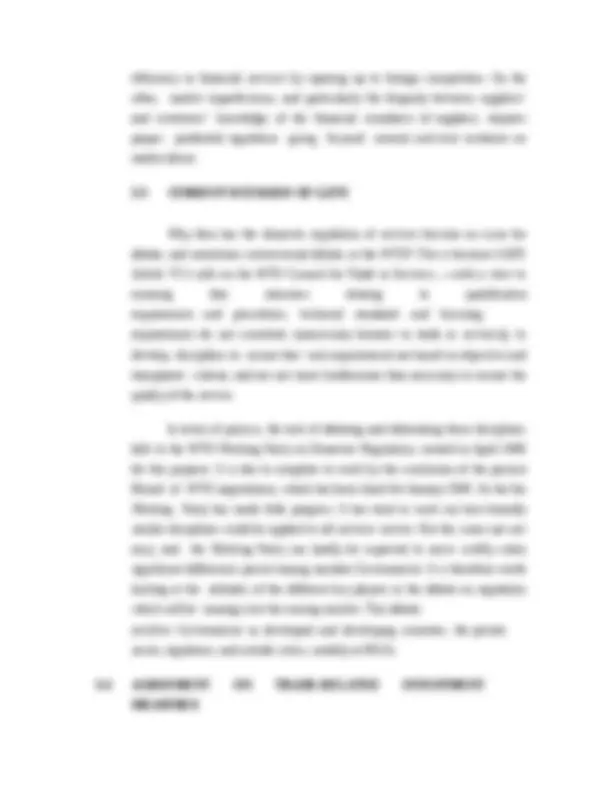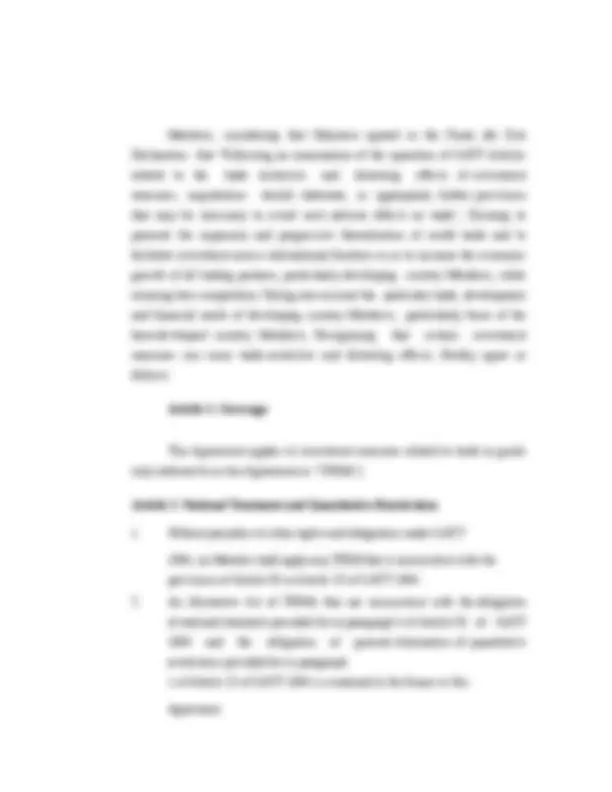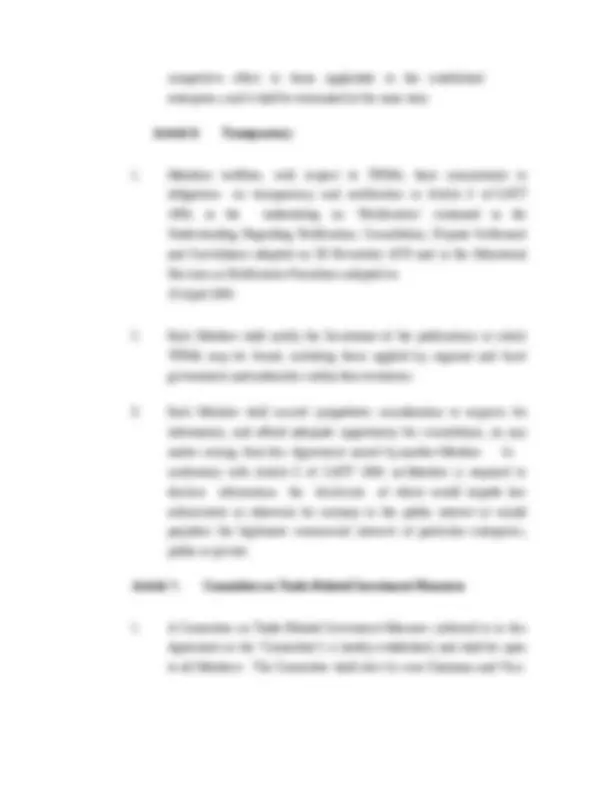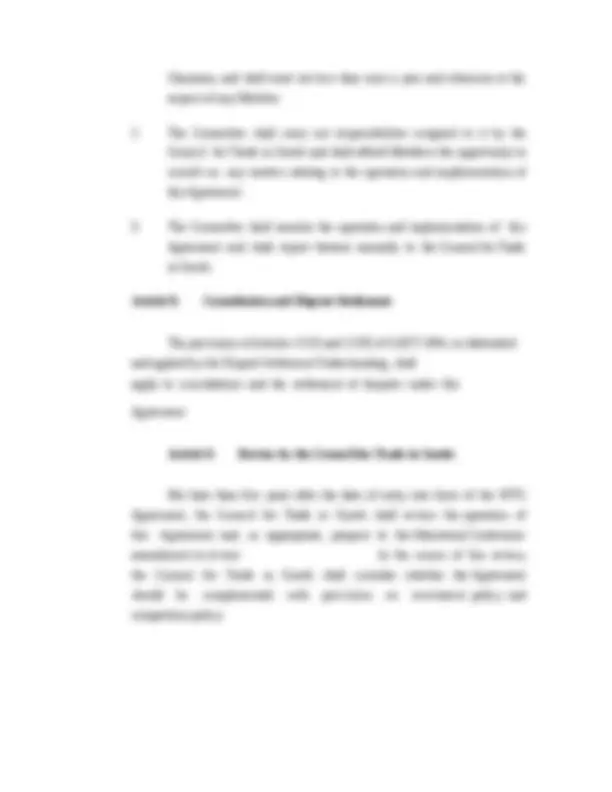







Study with the several resources on Docsity

Earn points by helping other students or get them with a premium plan


Prepare for your exams
Study with the several resources on Docsity

Earn points to download
Earn points by helping other students or get them with a premium plan
Community
Ask the community for help and clear up your study doubts
Discover the best universities in your country according to Docsity users
Free resources
Download our free guides on studying techniques, anxiety management strategies, and thesis advice from Docsity tutors
An overview of the world trade organization (wto) negotiations on trade in services, focusing on the general agreement on trade in services (gats) and the agreement on trade-related investment measures (trims). It discusses the background of the wto negotiations, current scenario of gats, and the principles enshrined in the gats agreement. The document also covers the agreement on trade-related investment measures and its provisions related to national treatment, quantitative restrictions, and transparency.
Typology: Study notes
1 / 9

This page cannot be seen from the preview
Don't miss anything!






The motive of the lesson is to know the background to the WTO Negotiations, current scenario of GATS, TRIPS, TRIMS, the private sector, views of EU and US Governments, developing countries and the regulators towards the service industries.
3.1 INTRODUCTION
Negotiations under way at the World Trade Organisation in Geneva will address, and perhaps to a significant extent reshape, the regulatory framework for financial and other services around the world. As they seek to reduce barriers to market access, those engaged in these talks are inevitably drawing lines between acceptable and unacceptable domestic regulation. Key constituencies are watching closely to see, and influence, where the lines will fall. Among the eager onlookers are private sector companies from, for instance, banking, insurance, securities and asset management, as well as national regulators and outside critics. Much of the debate in the WTO turns on the issue of whether there are general principles of regulation to which all can sign up. Here there are differences between developed and developing countries, and, to a degree that is becoming increasingly obvious, between the European Union and the United States. It is highly desirable that private sector views should be made known to Governments and regulators. To this end, there have been useful discussions between private sector representatives on both sides of the Atlantic. This article offers some analysis of the different positions taken both in the public and private sectors, and puts forward some suggestions on how, in due course, differences could be bridged.
3.2 THE BACKGROUND TO THE WTO NEGOTIATIONS
For most of the past fifty years international trade negotiations focused on trade in goods. However, the complex set of negotiations - the so-called Uruguay Round - which concluded in 1994 and created the World Trade Organisation also, and for the first time, covered trade in services. One of the agreements to emerge from the Uruguay Round, and to be administered by the WTO, is the General Agreement on Trade in Services, or GATS. The GATS Agreement was basically a framework agreement establishing general principles for WTO negotiations on services, itself a useful achievement. On financial services, as on most other services, member Governments were in many cases willing to undertake not to add to the restrictions faced by foreign suppliers. They did not commit themselves to dismantle these restrictions to any significant degree. The aim of the new negotiations is achieve significant liberalisation. That is in the interests of the big financial service exporters like the EU and US, whose markets are already largely open and who would gain from improved overseas access. It is no less in the interests of countries around the world whose markets are more protected but whose economic future depends on access to high quality financial and other services. The existing GATS provisions on domestic regulation
Among the important principles enshrined in the GATS Agreement are those related to domestic regulation. Articles III and VI of GATS effectively provide a blueprint for reconciling liberalisation and regulation. Regulations affecting trade in services have to be published. They must be administered in a reasonable, objective and impartial manner. Applicants to provide services which Governments have agreed to liberalise must be given an answer within a reasonable period. Administrative decisions must be subject to review. These and other provisions are designed to ensure that liberalisation is not frustrated by regulatory failings.
At the same time the need for proper prudential regulation is specifically acknowledged in the GATS annex on financial services. This came to be known
efficiency in financial services by opening up to foreign competition. On the other, market imperfections, and particularly the disparity between suppliers‘ and customers‘ knowledge of the financial soundness of suppliers, requires proper prudential regulation going beyond normal anti-trust restraints on market abuse.
3.3 CURRENT SCENARIO OF GATS
Why then has the domestic regulation of services become an issue for debate, and sometimes controversial debate, at the WTO? This is because GATS Article VI.4 calls on the WTO Council for Trade in Services, ―with a view to ensuring that measures relating to qualification requirements and procedures, technical standards and licensing requirements do not constitute unnecessary barriers to trade in services‖, to develop disciplines to ensure that such requirements are based on objective and transparent criteria, and are not more burdensome than necessary to ensure the quality of the service.
In terms of process, the task of debating and elaborating these disciplines falls to the WTO Working Party on Domestic Regulation, created in April 1999 for this purpose. It is due to complete its work by the conclusion of the present Round of WTO negotiations, which has been fixed for January 2005. So far the Working Party has made little progress. It has tried to work out how broadly similar disciplines could be applied to all services sectors. But the issues are not easy; and the Working Party can hardly be expected to move swiftly when significant differences persist among member Governments. It is therefore worth looking at the attitudes of the different key players in the debate on regulation which will be running over the coming months. This debate involves Governments in developed and developing countries, the private sector, regulators, and outside critics, notably in NGOs.
3.4 AGREEMENT ON TRADE-RELATED INVESTMENT MEASURES
Members, considering that Ministers agreed in the Punta del Este Declaration that "Following an examination of the operation of GATT Articles related to the trade restrictive and distorting effects of investment measures, negotiations should elaborate, as appropriate, further provisions that may be necessary to avoid such adverse effects on trade"; Desiring to promote the expansion and progressive liberalisation of world trade and to facilitate investment across international frontiers so as to increase the economic growth of all trading partners, particularly developing country Members, while ensuring free competition; Taking into account the particular trade, development and financial needs of developing country Members, particularly those of the least-developed country Members; Recognizing that certain investment measures can cause trade-restrictive and distorting effects; Hereby agree as follows:
Article 1: Coverage
This Agreement applies to investment measures related to trade in goods only (referred to in this Agreement as "TRIMs").
Article 2: National Treatment and Quantitative Restrictions
1994, no Member shall apply any TRIM that is inconsistent with the provisions of Article III or Article XI of GATT 1994.
developing country Member, including a least- developed country Member, which demonstrates particular difficulties in implementing the provisions of this Agreement. In considering such a request, the Council for Trade in Goods shall take into account the individual development, financial and trade needs of the Member in question.
1 In the case of TRIMs applied under discretionary authority, each specific application shall be notified. Information that would prejudice the legitimate commercial interests of particular enterprises need not be disclosed.
not benefit from the transitional arrangements provided in paragraph
Notwithstanding the provisions of Article 2, a Member, in order not to disadvantage established enterprises which are subject to a TRIM notified under paragraph 1, may apply during the transition period the same TRIM to a new investment (i) where the products of such investment are like products to those of the established enterprises, and (ii) where necessary to avoid distorting the conditions of competition between the new investment and the established enterprises. Any TRIM so applied to a new investment shall be notified to the Council for Trade in Goods. The terms of such a TRIM shall be equivalent in their
competitive effect to those applicable to the established enterprises, and it shall be terminated at the same time.
Article 6: Transparency
Article 7: Committee on Trade-Related Investment Measures